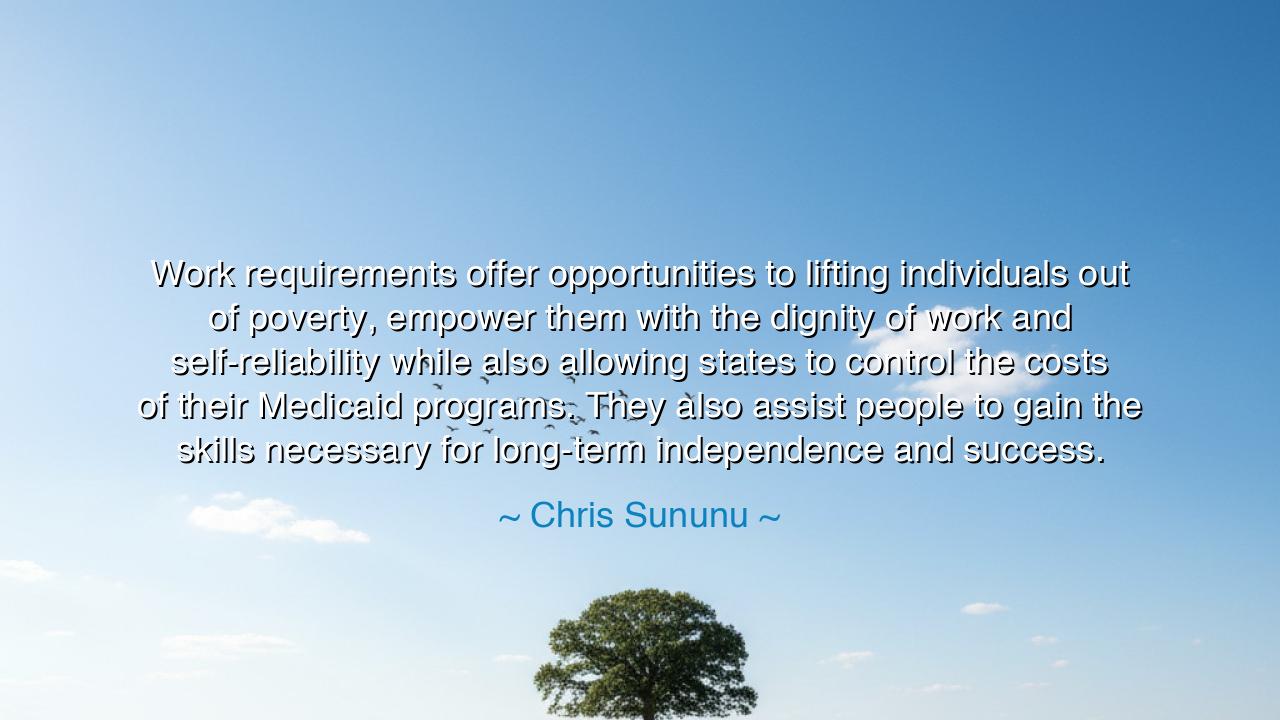
Work requirements offer opportunities to lifting individuals out
Work requirements offer opportunities to lifting individuals out of poverty, empower them with the dignity of work and self-reliability while also allowing states to control the costs of their Medicaid programs. They also assist people to gain the skills necessary for long-term independence and success.






“Work requirements offer opportunities to lifting individuals out of poverty, empower them with the dignity of work and self-reliability while also allowing states to control the costs of their Medicaid programs. They also assist people to gain the skills necessary for long-term independence and success.” Thus spoke Chris Sununu, a leader mindful of both compassion and responsibility, a governor who sought to weave together mercy and strength in the fabric of governance. His words carry a truth as old as civilization — that work is not a burden laid upon mankind, but a pathway to dignity, the sacred bridge between survival and purpose.
To understand his meaning, one must return to the ancient idea that labor is not mere toil, but an act of creation. From the farmer who tills the soil to the craftsman who shapes the stone, work has always been humanity’s dialogue with the world — the way we transform the raw into the radiant, the unseen into the possible. When Sununu speaks of lifting individuals out of poverty, he reminds us that charity alone cannot free the soul; only action can. True freedom is born when a person learns not only to receive, but to build, to shape their own destiny with their hands, their effort, their courage.
In the old days, wise rulers knew that sustenance without purpose was a prison of comfort. The philosopher Aristotle taught that happiness — the highest good — comes from activity in accordance with virtue. Likewise, Sununu’s vision suggests that self-reliability is not a punishment, but a gift — a call for every man and woman to awaken the sleeping power within them. For to work is to participate in the creative force of life itself. To work is to say, “I matter, I can give, I can rise.” And when work is joined with guidance and opportunity, poverty becomes not a permanent condition, but a chapter in the story of transformation.
Consider the tale of Franklin D. Roosevelt’s New Deal, born in the shadows of the Great Depression. In that time of despair, millions waited in breadlines, their hearts heavy with hopelessness. Roosevelt understood that relief alone could not restore a nation — people needed not only food, but purpose. Through programs like the Civilian Conservation Corps, he gave men the chance to work, to build bridges, plant trees, and renew both the land and their own spirits. It was not charity that saved them, but the dignity of being needed, the pride of seeing one’s hands shape the future. Sununu’s words carry that same eternal flame — that work, rightly structured, heals more than the body; it restores the soul.
Yet the governor also speaks to the balance of governance, the duty of states to be both compassionate and wise stewards of their people’s resources. In calling for work requirements, he envisions not cruelty, but partnership — a covenant between society and the individual. The state offers support, but the citizen offers effort. Together, they create a cycle of sustainability, where assistance is not a chain but a ladder. For just as the individual must be responsible to rise, so too must the community ensure that opportunity is real — that training, education, and pathways to employment are within reach. Thus, work requirements, when guided by fairness, can become instruments not of oppression, but of empowerment.
The heart of Sununu’s message lies in empowerment, in the ancient truth that every soul desires to stand on its own feet. Dependence, when prolonged, weakens the will; but purpose strengthens it. When a person gains skills for long-term independence, they gain far more than income — they gain identity, confidence, and hope. The spirit of the worker is the spirit of the builder, the healer, the dreamer — one who knows that effort is not suffering, but sacred striving. Work teaches patience, endurance, and humility — virtues that shape not only livelihoods, but character.
And so, my child of the modern age, take this lesson deeply to heart: never despise the labor that shapes you. Seek not only comfort, but growth; not only aid, but ability. If you are lifted, reach down to lift another; if you are strong, teach another to become strong. For society thrives not on dependence, but on shared purpose — when each person contributes, and each is valued for their effort and integrity. Remember that work, when joined with compassion, builds both nations and souls.
In the end, Sununu’s words remind us that the path to prosperity is not paved with ease, but with effort guided by grace. To labor with purpose is to honor the divine spark within, to live not as a burden upon the world, but as a blessing to it. So rise each day with gratitude for your tasks, however small, and see in them the sacred opportunity to build not only your life, but the future of all. For in the dignity of work, there lies the true wealth of humankind.






AAdministratorAdministrator
Welcome, honored guests. Please leave a comment, we will respond soon